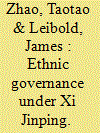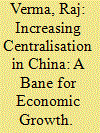| Srl | Item |
| 1 |
ID:
172245


|
|
|
|
|
| Summary/Abstract |
The motto ‘the Party rules everything’ is now a defining characteristic of governance in Xi Jinping’s ‘New Era’. This article analyzes the changing Party-state relationship by interrogating the competition between the Chinese Communist Party’s United Front Work Department and the State Council’s Ethnic Affairs Commission from the early 2000s, focusing particularly on the changes since Xi became leader in 2012. Through discourse analysis, the article documents the gradual yet significant shift in authority from the state to the Party in the institutional structures and ideological praxis of ethnic governance. It argues that the emerging power of the United Front Work Department over ethnic theory, policy and implementation signifies an important shift in ethnic governance through the intensification of integrationist solutions to China’s age-old ‘ethnic question’.
|
|
|
|
|
|
|
|
|
|
|
|
|
|
|
|
| 2 |
ID:
188679


|
|
|
|
|
| Summary/Abstract |
This article contends that increasing centralisation of decision-making in China will undermine the country’s future economic growth. It highlights the declining role of private enterprises and the increasing role of state-owned enterprises (SOEs) in the economy, and the extension of Communist Party influence in both SOEs and the private sector through the Party’s Organization Department and United Front Work Department. It argues that the increasing role of the state in the economy over the past decade has stifled growth through a decline in ‘total factor productivity’ because of increasing misallocation of resources. Centralisation, with associated losses in efficiency, objectivity, agility, speed and finesse regarding allocations of risks and investment, has debilitated decentralised decision-making and reduced the incentives for undertaking risks and innovation. The article argues that increasing Party control over the SOEs and the private sector will negatively impact the corporate structure and management decisions, exacerbate the fundamental problems of corporate governance and limit or hamper innovation.
|
|
|
|
|
|
|
|
|
|
|
|
|
|
|
|
| 3 |
ID:
193181


|
|
|
|
|
| Summary/Abstract |
With the incorporation of the State Administration for Religious Affairs (SARA) into the Chinese Communist Party’s (CCP) United Front Work Department in 2018, religious affairs have been brought back into the direct control of the Party. While SARA has retained its name, it is no longer an independent state agency. Five further legal measures were introduced from 2019 to 2021. This review essay examines these legal changes in order to update the dominant understanding of Xi Jinping’s attempt to reshape religious order in the hands of the CCP. The specific creation of regulations on Islamic affairs and the Internet also responds to Xi’s perceived problems regarding religious affairs in the contemporary era. Under the new measures, the state has demanded clear administration of religious groups, creating functions and positions like those in the Party’s branches. Beijing has further increased its control over religious personnel by establishing files on each of them, including details of any misconduct, in order to assess their trustworthiness. This essay concludes that the CCP continues to work toward the final eradication of religions in a Marxist manner and that China’s practices differ from existing international legal norms to which, at least nominally, China adheres as a signatory.
|
|
|
|
|
|
|
|
|
|
|
|
|
|
|
|